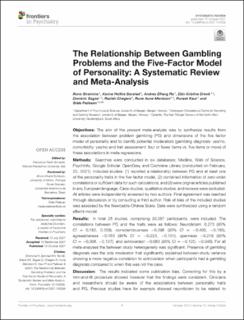| dc.description.abstract | Objectives: The aim of the present meta-analysis was to synthesize results from the association between problem gambling (PG) and dimensions of the five factor model of personality and to identify potential moderators (gambling diagnosis: yes/no, comorbidity: yes/no and trait assessment: four or fewer items vs. five items or more) of these associations in meta-regressions.
Methods: Searches were conducted in six databases; Medline, Web of Science, PsychInfo, Google Scholar, OpenGrey, and Cochrane Library (conducted on February, 22, 2021). Included studies: (1) reported a relationship between PG and at least one of the personality traits in the five-factor model, (2) contained information of zero-order correlations or sufficient data for such calculations, and (3) were original articles published in any European language. Case-studies, qualitative studies, and reviews were excluded. All articles were independently screened by two authors. Final agreement was reached through discussion or by consulting a third author. Risk of bias of the included studies was assessed by the Newcastle-Ottawa Scale. Data were synthesized using a random effects model.
Results: In total 28 studies, comprising 20,587 participants, were included. The correlations between PG and the traits were as follows: Neuroticism: 0.273 (95% CI = 0.182, 0.358), conscientiousness −0.296 (95% CI = −0.400, −0.185), agreeableness −0.163 (95% CI = −0.223, −0.101), openness −0.219 (95% CI = −0.308, −0.127), and extroversion −0.083 (95% CI = −0.120, −0.046). For all meta-analyses the between study heterogeneity was significant. Presence of gambling diagnosis was the only moderator that significantly explained between-study variance showing a more negative correlation to extroversion when participants had a gambling diagnosis compared to when this was not the case.
Discussion: The results indicated some publication bias. Correcting for this by a trim-and-fill procedure showed however that the findings were consistent. Clinicians and researchers should be aware of the associations between personality traits and PG. Previous studies have for example showed neuroticism to be related to treatment relapse, low scores on conscientiousness to predict treatment drop-out and agreeableness to reduce risk of treatment drop-out. | en_US |

